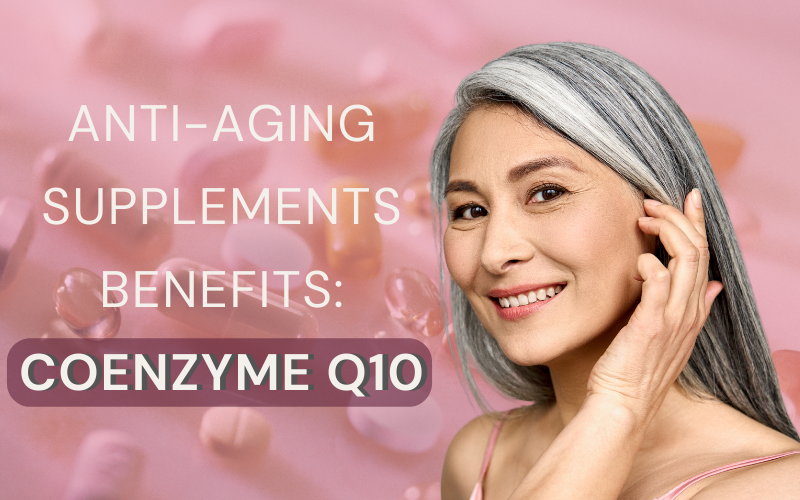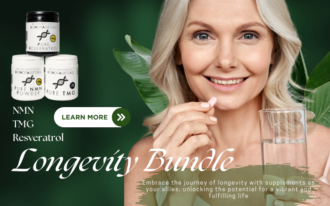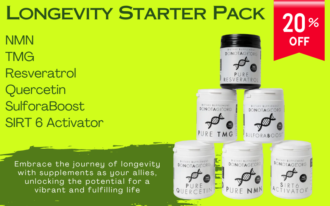An increase in the popularity of anti-aging supplements was driven by the search for effective ways to combat the effects of aging and preserve a youthful appearance. These supplements are specifically formulated to support overall health and address the signs of aging. Among the wide range of options available, one particular supplement that has garnered significant attention is Coenzyme Q10, commonly referred to as CoQ10. In this blog, we will delve into the numerous benefits of CoQ10 as an anti-aging supplement and explore how its consumption can contribute to a healthier and more youthful version of yourself.
Table of Contents
Disclaimer: This blog contains affiliate links, and I may receive a commission if you purchase through them.
What is Coenzyme Q10?
Coenzyme Q10, also known as CoQ10, is a naturally occurring compound that is found in every cell of the body. It plays a crucial role in the production of adenosine triphosphate (ATP), which is the primary source of energy for our cells. CoQ10 is a vital component of the electron transport chain, a process that occurs within the mitochondria of our cells and is responsible for generating ATP.
In addition to its role in energy production, CoQ10 also acts as a powerful antioxidant. Antioxidants are substances that help to neutralize harmful free radicals in the body. Free radicals are unstable molecules that can cause damage to cells and contribute to the aging process. By neutralizing these free radicals, CoQ10 helps to protect cells from oxidative damage and supports overall cellular health.
While our bodies naturally produce CoQ10, its levels tend to decline as we age. This decline in CoQ10 levels can be further exacerbated by certain medications, such as statins, which are commonly prescribed to lower cholesterol levels. Additionally, certain medical conditions, such as heart disease, Parkinson’s disease, and diabetes, can also deplete CoQ10 levels. Therefore, it is important to maintain adequate levels of CoQ10 to support overall health and well-being.
Protection against oxidative stress and free radicals
Oxidative stress is a major contributor to the aging process. It occurs when there is an imbalance between the production of free radicals and the body’s ability to neutralize them with antioxidants. Free radicals are highly reactive molecules that can damage cells and contribute to the development of age-related diseases.
Coenzyme Q10 acts as a potent antioxidant, neutralizing free radicals and protecting cells from oxidative damage. Studies have shown that CoQ10 supplementation can significantly reduce markers of oxidative stress and improve antioxidant capacity in the body [1]. By reducing oxidative stress, CoQ10 can help slow down the aging process and promote overall health.
Enhancement of cellular energy production
As mentioned earlier, CoQ10 plays a crucial role in the electron transport chain, which is responsible for producing ATP, the body’s main source of energy. By enhancing cellular energy production, CoQ10 supplementation can help combat fatigue and decreased vitality often associated with aging.
Several studies have demonstrated the positive effects of CoQ10 supplementation on energy levels. In a randomized controlled trial, participants who took CoQ10 experienced significant improvements in physical performance and reduced fatigue compared to those who took a placebo [2]. These findings suggest that CoQ10 supplementation can enhance energy production and improve overall vitality.
Maintenance of cardiovascular health
Cardiovascular diseases, such as heart disease and stroke, are leading causes of death worldwide, particularly among older adults. Coenzyme Q10 has been extensively studied for its role in supporting heart health and reducing the risk of age-related cardiovascular diseases.
CoQ10 is highly concentrated in the heart muscle, where it plays a crucial role in energy production and maintaining optimal heart function. Research has shown that CoQ10 supplementation can improve heart function, reduce the risk of heart failure, and improve symptoms in individuals with heart disease [3]. Additionally, CoQ10 has been found to have potential benefits for blood pressure regulation and cholesterol management, both of which are important factors in maintaining cardiovascular health [4].
Other Health Benefits of Coenzyme Q10
Support for brain health and cognitive function
The brain is highly susceptible to oxidative damage, which can contribute to age-related cognitive decline and neurodegenerative diseases such as Alzheimer’s and Parkinson’s. Coenzyme Q10 has shown promise in supporting brain health and cognitive function.
CoQ10 acts as a powerful antioxidant in the brain, protecting brain cells from oxidative damage and reducing inflammation [5]. Several studies have suggested that CoQ10 supplementation may improve cognitive function and slow down the progression of neurodegenerative diseases [6]. While more research is needed in this area, the potential benefits of CoQ10 for brain health are promising.
Potential anti-inflammatory effects
Chronic inflammation is a common feature of many age-related conditions, including arthritis and metabolic syndrome. Coenzyme Q10 has been found to have anti-inflammatory effects, which may help reduce the risk and severity of these conditions.
CoQ10 has been shown to modulate inflammatory pathways and reduce the production of pro-inflammatory molecules [7]. This can help alleviate chronic inflammation and its associated health risks. While more research is needed to fully understand the anti-inflammatory effects of CoQ10, its potential in managing age-related conditions is promising.
Skin health and anti-aging effects
The skin is one of the first areas to show signs of aging, such as wrinkles, sagging, and loss of elasticity. Coenzyme Q10 has been found to have beneficial effects on skin health and may help slow down the aging process.
CoQ10 plays a role in collagen synthesis, a protein that provides structure and elasticity to the skin. It also acts as an antioxidant, protecting the skin from oxidative damage caused by sun exposure and other environmental factors [8]. Studies have shown that topical application of CoQ10 can reduce the appearance of wrinkles and improve skin elasticity [9]. These findings suggest that CoQ10 may be a valuable addition to skincare routines for its anti-aging effects.
How to Incorporate Coenzyme Q10 into Your Routine
In general, Coenzyme Q10, like other anti-aging supplements, can be obtained through both dietary sources and supplementation. Foods rich in CoQ10 include organ meats, fatty fish, whole grains, and nuts [10]. However, it can be challenging to obtain sufficient amounts of CoQ10 through diet alone, which is why many people turn to supplementation.
When considering CoQ10 supplementation, it is important to consult with a healthcare professional to determine the appropriate dosage for your specific needs. The recommended dosage can vary depending on factors such as age, overall health, and any existing medical conditions. It is also important to note that CoQ10 supplements are generally considered safe for most individuals, but some people may experience mild side effects such as digestive upset or allergic reactions.
It is worth mentioning that CoQ10 supplements come in different forms, including capsules, softgels, and chewable tablets. Some formulations may also include other ingredients to enhance absorption. It is important to choose a reputable brand and follow the instructions provided on the product label.
Additional Anti-Aging Supplements
In addition to Coenzyme Q10 (CoQ10), there are several other anti-aging supplements that have been shown to improve overall health and potentially extend lifespan. These supplements target various aspects of aging and can provide a range of benefits. Here are a few examples:
Collagen Peptides:
Collagen is a protein that provides structure to the skin, joints, and other connective tissues. As we age, collagen production naturally declines, leading to wrinkles, joint stiffness, and decreased skin elasticity. Collagen peptide supplements can help support collagen production and improve skin health, joint function, and hair and nail strength.
Omega-3 Fatty Acids:
Omega-3 fatty acids, such as EPA and DHA, are essential fats that have been shown to have numerous health benefits. They have anti-inflammatory properties, support heart health, and may improve cognitive function. Omega-3 supplements derived from fish oil or algae can be beneficial for overall health and may help slow down the aging process.
Resveratrol:
Resveratrol is a natural compound found in grapes, red wine, and certain berries. It has been shown to have antioxidant and anti-inflammatory effects, and may help protect against age-related diseases. Resveratrol supplements can provide a concentrated dose of this beneficial compound and may support healthy aging.
Vitamin C:
Vitamin C is a powerful antioxidant that plays a crucial role in collagen synthesis, immune function, and skin health. It helps protect against free radicals and supports the body’s natural repair processes. Vitamin C supplements can be beneficial for overall health and may help reduce the appearance of wrinkles and improve skin texture.
Vitamin D:
Vitamin D is essential for bone health, immune function, and overall well-being. As we age, our ability to produce vitamin D from sunlight decreases, making supplementation important. Vitamin D supplements can help maintain optimal levels and support healthy aging.
Probiotics:
Probiotics are beneficial bacteria that support a healthy gut microbiome. They help improve digestion, boost immune function, and may have anti-inflammatory effects. Probiotic supplements can help maintain a balanced gut microbiota, which is important for overall health and may contribute to healthy aging.
Green Tea Extract:
Green tea extract is rich in antioxidants called catechins, which have been shown to have anti-aging effects. They help protect against oxidative stress, support heart health, and may have anti-inflammatory properties. Green tea extract supplements can provide a concentrated dose of catechins and may promote healthy aging.
Curcumin:
Curcumin is the active compound found in turmeric, a spice known for its anti-inflammatory properties. It has been shown to have antioxidant effects, support brain health, and may help protect against age-related diseases. Curcumin supplements can be beneficial for overall health and may contribute to healthy aging.
Alpha-Lipoic Acid:
Alpha-lipoic acid is a powerful antioxidant that helps regenerate other antioxidants in the body, such as vitamins C and E. It has been shown to have anti-inflammatory effects, support healthy blood sugar levels, and may protect against age-related cognitive decline. Alpha-lipoic acid supplements can be beneficial for overall health and may contribute to healthy aging.
Nicotinamide Mononucleotide (NMN)
NMN is a molecule that plays a crucial role in cellular energy production and is a precursor to nicotinamide adenine dinucleotide (NAD+), a coenzyme involved in various cellular processes. NMN has gained attention for its potential anti-aging effects and has been studied for its benefits in promoting healthy aging.
NMN supplementation has been shown to increase NAD+ levels in cells. NAD+ is involved in important cellular processes, including energy metabolism, DNA repair, and gene expression. By boosting NAD+ levels, NMN may support overall cellular health and function.
Other benefits include the Support Mitochondrial Functions Enhances DNA Repair: Supports Cardiovascular Health, Supports Brain Health, Promotes Metabolic Health, Anti-Inflammatory Effects, and Potential Longevity Benefits.
It is important to note that while NMN shows promise in preclinical and animal studies, more research is needed to fully understand its effects on human health and aging. It is always recommended to consult with a healthcare professional before starting any new supplement regimen.
Remember, a holistic approach to healthy aging includes a balanced diet, regular exercise, stress management, and adequate sleep, in addition to considering supplements like NMN and others.
Please note that it is important to consult with a healthcare professional before starting any anti-aging supplements regimen to ensure they are safe and appropriate for your individual needs. Additionally, a balanced diet, regular exercise, stress management, and adequate sleep are essential components of a holistic approach to healthy aging.
Should you need additional information on NMN, please read the following article: Unlocking the Secrets of Longevity: Exploring the Benefits of NMN
Conclusion
In conclusion, Coenzyme Q10 (CoQ10) is a powerful anti-aging supplement that offers a range of benefits for overall health and vitality. Its antioxidant properties help protect against oxidative stress and free radicals, while its role in energy production enhances cellular function and reduces fatigue. CoQ10 also supports cardiovascular health, brain function, and may have anti-inflammatory effects. Additionally, it has shown promise in improving skin health and reducing the signs of aging.
If you are interested in incorporating CoQ10 into your anti-aging routine, it is important to consult with a healthcare professional to determine the appropriate dosage and ensure it is safe for you. Remember that supplements should be used in conjunction with a healthy lifestyle, including a balanced diet, regular exercise, and adequate sleep. Regular medical check-ups are also important to monitor your overall health and address any specific concerns.
By taking a holistic approach to anti-aging, including the use of supplements like CoQ10, you can support your body’s natural processes and maintain a youthful, vibrant life.
References
1. Reference for CoQ10’s role as an antioxidant and its ability to reduce oxidative stress:
Lee BJ, Huang YC, Chen SJ, Lin PT. Coenzyme Q10 supplementation reduces oxidative stress and increases antioxidant enzyme activity in patients with coronary artery disease. Nutrition. 2012;28(3):250-255. https://pubmed.ncbi.nlm.nih.gov/22153127/
2. Reference for CoQ10’s effects on physical performance and fatigue reduction:
Mizuno K, Tanaka M, Nozaki S, et al. Antifatigue effects of coenzyme Q10 during physical fatigue. Nutrition. 2008;24(4):293-299. https://pubmed.ncbi.nlm.nih.gov/18272329/
3. Reference for CoQ10’s benefits for heart health and heart disease:
Mortensen SA, Rosenfeldt F, Kumar A, et al. The effect of coenzyme Q10 on morbidity and mortality in chronic heart failure: results from Q-SYMBIO: a randomized double-blind trial. JACC Heart Fail. 2014;2(6):641-649. https://pubmed.ncbi.nlm.nih.gov/25282031/
4. Reference for CoQ10’s potential benefits for blood pressure regulation and cholesterol management:
Rosenfeldt FL, Haas SJ, Krum H, et al. Coenzyme Q10 in the treatment of hypertension: a meta-analysis of the clinical trials. J Hum Hypertens. 2007;21(4):297-306. https://pubmed.ncbi.nlm.nih.gov/17287847/
5. Reference for CoQ10’s role in protecting brain cells and potential benefits for cognitive function:
Shults CW, Oakes D, Kieburtz K, et al. Effects of coenzyme Q10 in early Parkinson disease: evidence of slowing of the functional decline. Arch Neurol. 2002;59(10):1541-1550. https://pubmed.ncbi.nlm.nih.gov/12374491/
6. Reference for CoQ10’s potential benefits for neurodegenerative diseases:
Yang X, Yang Y, Li G, Wang J, Yang ES. Coenzyme Q10 attenuates β-amyloid pathology in the aged transgenic mice with Alzheimer presenilin 1 mutation. J Mol Neurosci. 2008;34(2):165-171. https://pubmed.ncbi.nlm.nih.gov/18074223/
7. Reference for CoQ10’s anti-inflammatory effects:
Lee BJ, Tseng YF, Yen CH, Lin PT. Effects of coenzyme Q10 supplementation (300 mg/day) on antioxidation and anti-inflammation in coronary artery disease patients during statins therapy: a randomized, placebo-controlled trial. Nutr J. 2013;12:142. https://pubmed.ncbi.nlm.nih.gov/24119563/
8. Reference for CoQ10’s role in collagen synthesis and protection against photoaging:
Prahl S, Kueper T, Biernoth T, et al. Aging skin is functionally anaerobic: importance of coenzyme Q10 for anti aging skin care. Biofactors. 2008;32(1-4):245-255. https://pubmed.ncbi.nlm.nih.gov/19096122/
9. Reference for CoQ10’s benefits for reducing wrinkles and improving skin elasticity:
Hoppe U, Bergemann J, Diembeck W, et al. Coenzyme Q10, a cutaneous antioxidant and energizer. Biofactors. 1999;9(2-4):371-378. https://pubmed.ncbi.nlm.nih.gov/10416055/
10. Reference for dietary sources of CoQ10:
Healthline. Coenzyme Q10 (CoQ10) – Foods, Benefits, Dosage, and Side Effects. Accessed on October 20, 2021. https://www.healthline.com/nutrition/coenzyme-q10#food-sources
Please note that the references provided are for informational purposes and do not constitute medical advice. It is always recommended to consult with a healthcare professional before starting any new supplement regimen.

















Pingback: The Power of Berberine: Benefits, Uses, Side Effects and More Explained - Healthy Living Journey